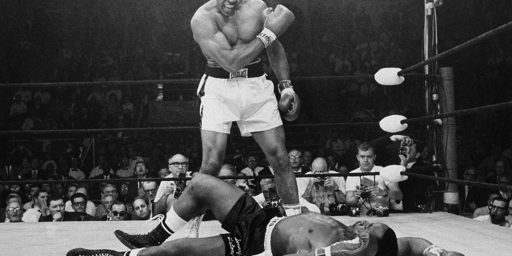Conscientious Objector or Coward?
Breaking Ranks to Shun War (LAT)
His sergeant called him a coward to his face. His chaplain sent him an e-mail saying he was ashamed of him. His commanders had him formally charged with desertion.
Sgt. Kevin Benderman, who has served one tour of duty in Iraq, is refusing to serve another. When his fellow soldiers of the 3rd Infantry Division packed their gear and left nearby Ft. Stewart for Iraq last week, Benderman stayed home. He says he has chosen to follow his conscience — not his commanders. After 10 years in the Army, Benderman has applied for a discharge as a conscientious objector — a heresy to many in the military at a time when the country is fighting two wars overseas. Today, Benderman, 40, will attend a military court hearing at Ft. Stewart that will determine whether he will face a court-martial for desertion and failure to report for a unit deployment. He could face up to seven years in prison if convicted.
“War is the greatest form of wrong,” Benderman wrote in his seven-page conscientious objector application. “I believe that my moral obligation to humanity is to not allow myself to be a part of this destruction.”
[…]
Only a handful of conscientious objector applications have been filed during the wars in Iraq and Afghanistan, which are being fought by professional soldiers, not draftees. Vietnam, a war that bitterly divided the U.S., produced 172,000 conscientious objector applications from draftees and 17,000 from active-duty soldiers. For the Iraq and Afghanistan wars, applications increased from 23 in 2002 to 60 in 2003 and 67 last year, according to Pentagon figures. Of those applications, 71 — almost half — have been approved. Unlike Benderman, few applicants have spoken publicly about their beliefs.
[…]
Like all new recruits, Benderman signed a statement saying he was not a conscientious objector. However, the military accepts applications made by soldiers who, like Benderman, say their beliefs have changed during their service.
Conscientious objection is a long-standing principle in America. As early as 1673, Rhode Island provided alternative militia service for conscientious objectors. In 1701, Pennsylvania under William Penn provided that anyone with a proven conscientious objection to war “shall not be in any case be molested or prejudiced.”
As Phil Carter notes, the fact that Benderman has already been in the military a number of years will make it harder to establish his claim. The realities of war change some people fundamentally, so it’s not inconceivable that Benderman’s revised view of the morality of warfare is legitimate, rather than a coward’s attempt to shirk the duty for which he volunteered.
Still, the timing of Benderman’s conversion is unhelpful. Had he filed for conscientous objector status soon after his return from combat, on the grounds that his new perspective on war made him unfit for continued military service, let alone a position of leadership, I would be much more sympathetic to his plight. He stayed on, though, for over a year and suddenly petitioned to get out only when sent back to fight. In so doing he let down the soldiers entrusted to him.






Dishonorable discharge, forfeiture of all pay and allowances, escort to the Canadian or Mexican border with a one-way passport.
He should just say he’s gay.